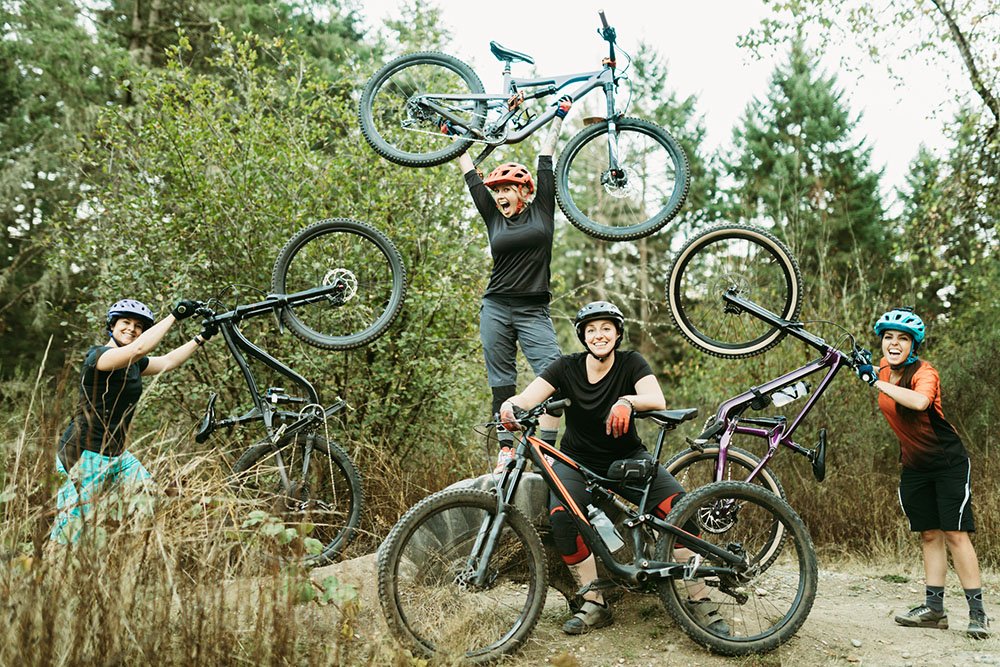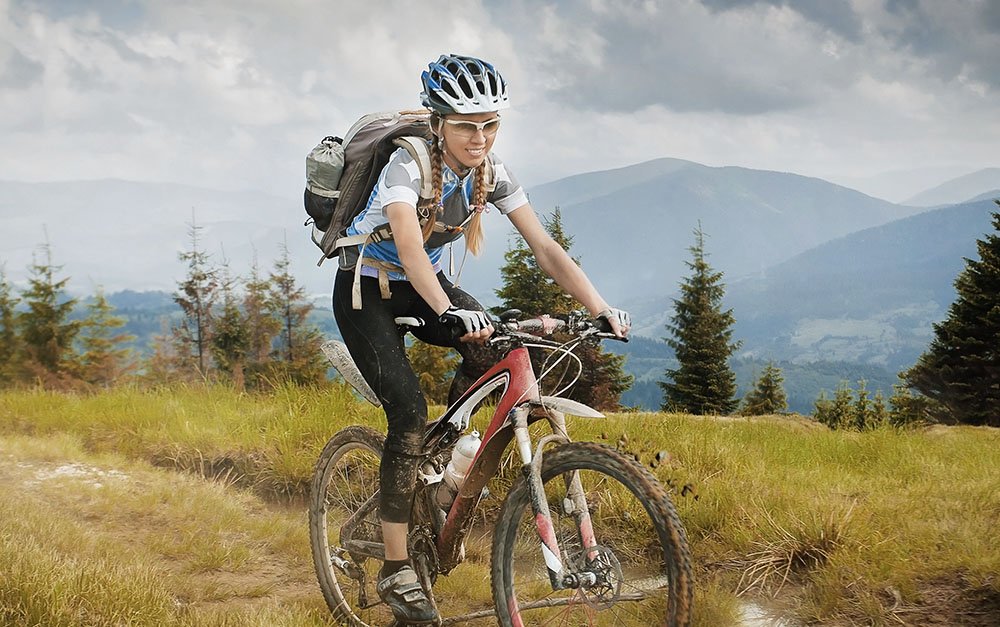
Women’s only cycling and triathlon camps are becoming increasingly popular, but one area where the gender bias is particularly apparent is mountain biking. It’s a common assumption that more men than women ride MTB, but is this really the case? We’ve dug a little deeper to see what the data shows…
Firstly, popular media tend to over-emphasise the perceived danger in the sport, often portraying an ideology of ‘hegemonic masculinity’. Don’t worry, you’ve not accidentally clicked on a Gender Studies essay! This is just a fancy term that basically means that it legitimises men’s dominance in the sport and justifies the fact that fewer women take part. It’s a self-perpetuating problem.
So, it’s no surprise that a 2010 survey by the IMBA (International Mountain Biking Association) showed that 60% of women believed that the perception of mountain biking as “hard-core” was deterring women from participating. Now obviously, women are not delicate little flowers that need to be protected, but given that studies repeatedly show that males dominate the field of mountain biking, a closer look can provide some interesting insights. Even here on UK soil, Scotland’s National Forest Estate’s data shows that 76% of their visitors who come to take part in mountain biking are male.
A recent study, “Why do you ride?: The characterization of mountain bikers” made some very interesting revelations:
- Compared to just 20% of women, 40% of men indicated they were “advanced or pro riders”.
- Men also stated they had been riding for longer, often since childhood, than women (45% vs 28% respectively). This difference could explain why less women take it up if it is not a sport they are familiar with – not many of us enjoy the feeling of being out of our depth, or like we’ve started something too late.
- Another interesting point is that men indicated that they enjoy the risk involved more than females, just as the popular media has encouraged.
- Conversely, women said that mountain biking helped them to deal with mild mental health difficulties at a higher rate than men – perhaps this is down to men speaking less about their emotions in general at a societal level.
So, with men having ridden for longer and rating themselves at a higher ability level, it’s easy to see why a mixed-gender camp could be an intimidating place for women to attempt to improve their skills. One place where they are trying to change this is MTB Beds. In an effort to introduce more women to mountain biking, the company runs an all female camp – Women, blow your limits. The camp is run by Finale Ligure EWS Challenger Champion, Sandra Boener who, in the words of MTB Beds, is “someone we knew could show us a thing or two on the bike.” We caught up with Sandra to get her views on women in MTB and learn more about the camp.
How did you get into mountain biking in the first place?
That’s quite a while ago now! I started riding cross-country in 2003 when a cycling club opened in my hometown.
If you did other types of cycling first, what do you enjoy about mountain biking compared to other kinds of cycling?
I never did other types of cycling apart road cycling which I used for training, but what I love is just being outside in nature. When you’re on a mountain bike in the woods and the mountains, you just forget everything and can switch off.
Why should women come on your camp? What skills can they learn and how is it different from other holidays that are mixed for men and women?
They should come because the Finale Ligure trails and the lifestyle there is amazing. I can guarantee it will be a week full of fun riding and some really good food! The week won’t be a proper skills camp, where we do a lot of technical training or that sort of thing – like the name suggests, we will blow our limits! I believe in action rather than theory as the best way to learn, so you can bet we’ll do a lot of riding. You just have to get out there and do it, there’s no point just talking about something or watching someone else doing it instead of you. For those who are a bit nervous, I’ll of course be answering any questions and we’ll stop and tackle tricky sections together, taking the time to look for the best line choices.
Riding with men can be lot of fun, but having just women in a group is, for some, a bit more relaxing and less stressful. We women also think differently about riding; sometimes we need more time to trust in ourselves and without the boys we can take the time we need.

What do you enjoy about coaching women specifically – is it any different to coaching men?
To be honest, this year will be my first coached camp. When I guide I am always open for questions and happy to help people to get better or to improve their riding skills. The difference between coaching men and women, in my eyes, comes down to patience. Obviously this is just my opinion and won’t apply to everyone, but I tend to see that men trust in themselves and have a lot more self confidence than women. Women need more time, even when we know that we can do it. Men are happier to just give it a go without necessarily thinking about it as much.
What do you think puts more women off trying mountain biking?
Good question! I’m not really sure but maybe they are scared about the speed, the rocks, the crashes? All the dangerous things can happen when you do an extreme sport.
How has mountain biking changed for women since you started riding? What other changes would you like to see?
I see a lot more girls on bikes than a few years ago. There are more women-specific clothes and bikes to cater to the growing market, although whether this is what women actually want is another discussion altogether. As for the changes, I definitely want to see an end to sexualised adverts for bikes that use women – it’s outdated, it’s incredibly lazy and to be honest I think it’s b*llsh*t. Women can ride just as well as men and you can sell your product just fine without sex – if not, you need to improve your product. You respect boys so why not the girls, too?
Who are your role models in the sport?
I don’t have a proper role model. I’m impressed by the world cup racers who train hard for their goals and push themselves even harder to their limits during a race. I also love watching clips from other riders like Niki Whiles or Vero Sandler; they are not proper racers per se, but they definitely have amazing skills.
Where would be your dream destination to ride?
That’s a tough decision… I know I definitely want to ride in Whistler. Its the most famous bike park in the world and from what I’ve seen and heard it seems like a bike park paradise. The same goes for New Zealand; the landscape and the tracks look great and there’s so much to discover. It looks like a once-in-a-lifetime trip but I’m sure if I went once I would want to go back for more!
There are still spaces available on the camp so if you’re tempted by the idea of giving it a try, visit the MTB beds website to learn more and secure your place.
Yellow Jersey bicycle insurance will cover your bicycle for mountain biking worldwide and our travel insurance is specifically tailored to look after you should you have an accident on a mountain biking holiday.